INTERNATIONAL INVESTMENT
AND PORTAL
What do you believe are some of the more specific challenges facing both investors and the Vietnamese government in infrastructure investment?
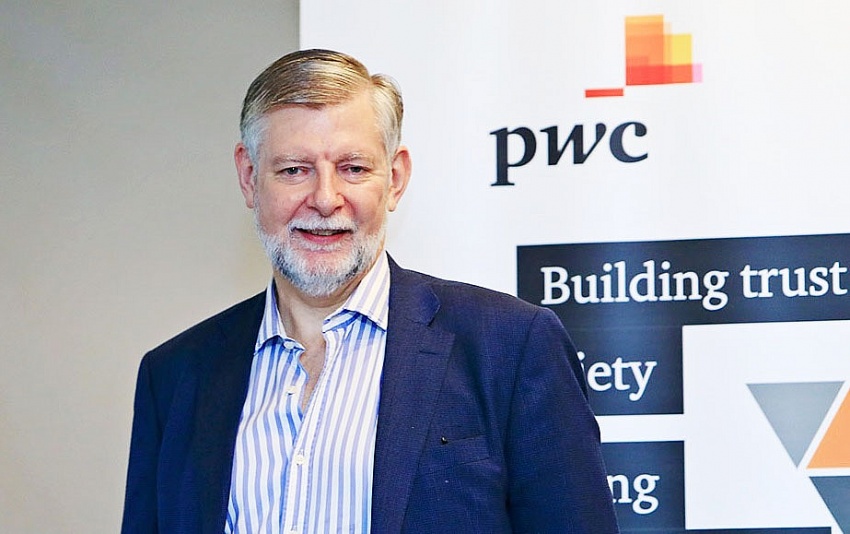 Edward Clayton, partner and leader of Capital Projects and Infrastructure at PwC Vietnam and Malaysia
Edward Clayton, partner and leader of Capital Projects and Infrastructure at PwC Vietnam and Malaysia
Over the past few years, the development of infrastructure in Vietnam has been progressing rapidly, resulting in the emergence of new and advanced infrastructure. However, with the increasing complexity of the infrastructure network, it is becoming more challenging to comprehend how the various infrastructure elements support each other, and what additional infrastructure is required to enhance its functionality. This presents a significant obstacle for investors who have to predict the demand for infrastructure in a constantly evolving landscape.
As new infrastructure continues to emerge, alternative modes of transport and access routes are becoming available, making it difficult to determine the precise demand for a given infrastructure project. This difficulty in predicting the cash flow generated by an infrastructure project is an indication of the increasing complexity of infrastructure investment.
To successfully navigate this complex terrain, investors must have a thorough understanding of the interdependence between various infrastructure projects and how they relate to one another. With thorough analysis and planning, investors can identify the most promising infrastructure investment opportunities, predict future cash flows, and make informed decisions that will lead to a more sustainable and prosperous future for Vietnam.
How do you assess the development of infrastructure investment in Vietnam?
It has seen both successes and challenges in recent years, with renewable energy investments in wind and solar shining as a prime example of achievement. However, the government has learned valuable lessons from past investments, and they have set their sights on securing better deals for themselves moving forward.
Generous payments to investors were a contributing factor to the success of the infrastructure projects in the past, but the Vietnamese government now seeks to negotiate better deals for themselves, which requires a more strategic approach.
Moving forward, it is essential to develop a comprehensive understanding of how to negotiate and structure deals that benefit both investors and the government. This task requires substantial effort, and careful planning to achieve a successful outcome. While renewable energy investments have been successful in the past, there are other infrastructure projects that require attention, such as transportation, telecommunications, and healthcare, where investors must navigate complex regulatory environments, bureaucratic obstacles, and opaque decision-making processes.
Investors must, therefore, have a nuanced understanding of the socio-political landscape, legal frameworks, and market dynamics to make well-informed decisions.
In other industries, such as banking and financial services, the government sets different caps on foreign ownership. What does this look like in terms of infrastructure funding?
In general, the foreign ownership limit in infrastructure investment is contingent upon the specific type of infrastructure, with some being significantly more accessible to foreign investors than others. While the government has not instituted a set policy limit, it has expressed a preference for robust Vietnamese participation, particularly in toll road development, underscoring the importance of bolstering local infrastructure capabilities.
As a result, there has been an uptick in collaborative efforts between foreign and Vietnamese investors, leveraging the country’s formidable construction sector expertise to further advance infrastructure investment.
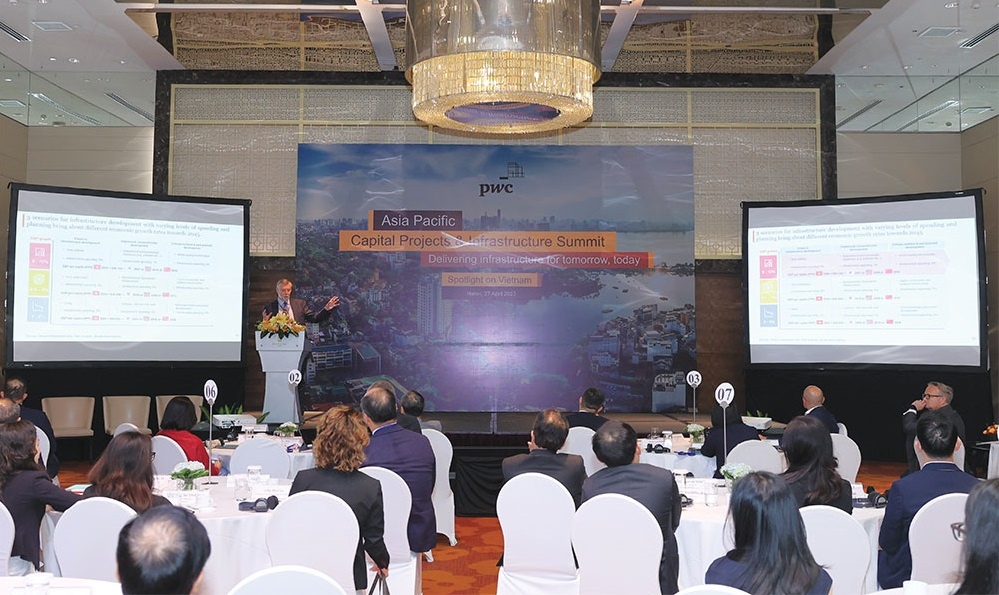 PwC’s Asia-Pacific Capital Projects & Infrastructure Summit took place on April 27 in Hanoi
PwC’s Asia-Pacific Capital Projects & Infrastructure Summit took place on April 27 in Hanoi
Amid the flurry of investment pouring into Vietnam’s infrastructure industry, which country is emerging as the frontrunner, and what makes their approach so compelling?
Several nations are heavily investing in Vietnam’s infrastructure, with a significant amount of investment flowing through Singapore. While China is one of the primary investors, various countries such as India, Japan, Germany, and France are also exploring investment opportunities in Vietnam.
It’s critical to determine which countries have the financial resources and expertise to undertake infrastructure development projects. Countries with large pension funds, such as Australia and Canada, have significant financial capabilities to invest in infrastructure. Meanwhile, Spain and Germany excel in private sector investment, making them ideal candidates for developing infrastructure in Vietnam. Multinational groups often collaborate on infrastructure projects in the country, highlighting the importance of international cooperation.
A financing index published by PwC last year has shed light on Vietnam’s position as the most promising investment destination for international investors worldwide. This publicly available research underscores Vietnam’s infrastructure sector’s unparalleled attractiveness to investors, making it an optimal site for developing infrastructure.
However, it is crucial to note that investors from different countries are inclined to invest in specific sectors based on their strengths and policies. For instance, South Korean investors’ growing interest in Vietnam’s renewable energy and power sectors while remaining less involved in its water sector.
Similarly, although Chinese investors are often associated with large-scale transportation infrastructure projects, other players such as Japanese and South Korean investors are equally impactful in developing Vietnam’s manufacturing and green infrastructure sectors.
As such, it is paramount to engage investors with the appropriate expertise to ensure efficient infrastructure development in this country.
What are the pros and cons of donor-funded infrastructure projects in Vietnam?
Vietnam’s infrastructure sector has undoubtedly undergone significant transformation with the support of generous donors over the past 20-30 years. Donor-funded projects often come with their technology, which may not be the optimal solution for Vietnam’s unique infrastructure needs.
Hence, Vietnam needs to break free from this dependency and develop its own capabilities to determine the most appropriate infrastructure solutions. As Vietnam’s infrastructure industry matures, it is time to let go of the donor’s hand-holding and embrace a more independent approach.
The Vietnamese government has started taking a more assertive stance towards infrastructure projects, actively evaluating the compatibility of proposed solutions to ensure that they align with Vietnam’s particular context. The focus has shifted towards identifying practical solutions that are customised to Vietnam’s unique infrastructure needs, rather than blindly accepting the donor’s perspective.
By taking this bold step, Vietnam can stand tall and emerge as a leader in designing innovative infrastructure solutions that cater to its unique requirements.
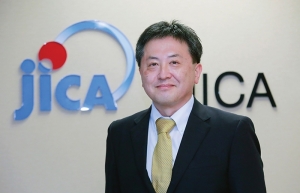 Infrastructure investment to aid the social recovery
Infrastructure investment to aid the social recovery
In many developing countries, insufficient and poor infrastructure has resulted in stagnation in the flow of resources, difficulty in absorbing investment capital, causing bottlenecks and directly affecting economic growth. Therefore, investment in developing infrastructure has been a priority of many developing countries, including Vietnam.
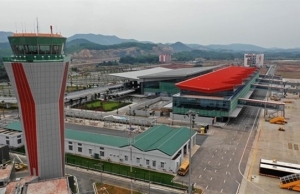 Airport infrastructure investment needs private involvement: insiders
Airport infrastructure investment needs private involvement: insiders
Public investment alone is insufficient to finance new airport infrastructure, exposing the need for more favourable policies to draw in private investment.
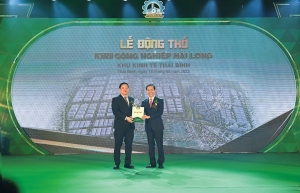 Hai Long IP highlights Thai Binh rise
Hai Long IP highlights Thai Binh rise
After receiving approval from the prime minister, Thai Binh provincial authorities together with Bao Minh Industrial Park Infrastructure Investment JSC has kicked off construction of Hai Long Industrial Park.



















